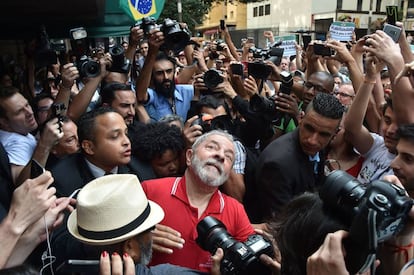Is Brazil’s Lula the target of a smear campaign?
The media has covered graft accusations widely, despite little hard evidence against ex-president


The corruption and money-laundering accusations that will see Brazil’s former president Lula da Silva face trial have further poisoned Brazil’s toxic political waters, weakening the position of his Workers’ Party (PT), which is already reeling from the impeachment of Lula’s predecessor, Dilma Rousseff.
The major force in Brazilian politics as recently as just two years ago, when Rousseff won a second term with more than 51% of the vote in the October 2014 general elections, the PT has been brought to its knees by a lengthy judicial investigation into graft at state oil company Petrobras. Lula, who was pondering standing for reelection in 2018, now faces an uncertain future.
In July, a nationwide survey showed that Lula would win the presidential elections of 2018 if he stood in the contest, as he had suggested he might. This was yet another illustration of the popularity of the man who led the country between 2002 and 2010, lifting 30 million Brazilians out of poverty during that time.
If Lula’s enemies topple him, they will effectively put the PT out of the running in the 2018 elections
It was also a clear warning that should Lula decide to stand, anybody considering running against him would have their work cut out.
Fortunately for Lula’s rivals, for most of the last year, the former union leader’s name has rarely been out of the news in connection with the ongoing revelations emerging from the Petrobras investigation.
On Tuesday, federal judge Sérgio Moro, a crusading magistrate who has investigated the hundreds of cases involving bribery, corruption, money laundering, fraud, embezzlement and just about every other financial crime uncovered at Petrobras, announced that he would put Lula in the dock to face charges that he had accepted a $1.1-million bribe from a company involved in the corruption scam along with a luxury apartment.
Lula was already facing charges before all this: in July, Moro announced he would be taking up a case centered on an accusation that Lula had tried to bribe a former Petrobras official to keep quiet over the siphoning-off of funds from the state oil company.
A political conspiracy
So far, these are the only accusations Lula will stand trial for. There have been many others, so many in fact that some political commentators believe that Lula is the target of a political conspiracy to end his career by ruining his reputation and tying him up in legal cases that will prevent him from running for office.
In March, Lula was taken to a police station by two uniformed officers to answer questions about his role in the Petrobras case. The cameras were there to capture the moment, and the next day, his photograph, in which he was flanked by the policemen, was on every front page.
A few days later, prosecutors called for Lula to be held in preventive custody, charging that he headed a ring that had used violence to intimidate officials at Petrobras. The request was denied. A couple of weeks later, a telephone conversation with Rousseff was leaked to the media in which the pair discussed appointing Lula to a ministerial post, which would protect him from prosecution.
In May, when Brazil’s Congress voted to impeach Rousseff, Lula disappeared from the headlines. After Rousseff was impeached and left office in late August, Lula is back in the news, reinforcing the former president’s arguments that he is the target of a smear campaign led by powerful, behind-the-scenes forces in cahoots with the media.
The PT has been brought to its knees by a lengthy judicial investigation into graft at state oil company Petrobras
Last week, federal prosecutors appeared on television to accuse Lula of orchestrating every single case of corruption at Petrobras. The only evidence they presented was the luxury apartment Lula had been accused of accepting. When judge Moro accepted the case, he warned that the evidence against Lula was “open to question” but that “in this preliminary stage no conclusions are required.”
If the aim of Lula’s enemies is to topple him, in doing so they will effectively put the PT out of the running in the 2018 elections: there is nobody in the party whose popularity comes close to Lula’s. Fernando Haddad, the mayor of São Paulo, Brazil’s biggest city, would be the most likely candidate to step in. But the polls suggest that he will lose his job after the municipal elections in early October: he is predicted to win less than 9% of the vote.
Should Lula be brought down and is unable to stand for election in two years time, then the PT, once Latin America’s most powerful left-wing force, will be sidelined, perhaps for many years. Rousseff’s approval rating was 80% in 2010; by August this year, when she was about to be impeached, it had fallen to 8%. Now all that stands in the way of the PT’s demise is a 71-year-old man.
English version by Nick Lyne.
Tu suscripción se está usando en otro dispositivo
¿Quieres añadir otro usuario a tu suscripción?
Si continúas leyendo en este dispositivo, no se podrá leer en el otro.
FlechaTu suscripción se está usando en otro dispositivo y solo puedes acceder a EL PAÍS desde un dispositivo a la vez.
Si quieres compartir tu cuenta, cambia tu suscripción a la modalidad Premium, así podrás añadir otro usuario. Cada uno accederá con su propia cuenta de email, lo que os permitirá personalizar vuestra experiencia en EL PAÍS.
¿Tienes una suscripción de empresa? Accede aquí para contratar más cuentas.
En el caso de no saber quién está usando tu cuenta, te recomendamos cambiar tu contraseña aquí.
Si decides continuar compartiendo tu cuenta, este mensaje se mostrará en tu dispositivo y en el de la otra persona que está usando tu cuenta de forma indefinida, afectando a tu experiencia de lectura. Puedes consultar aquí los términos y condiciones de la suscripción digital.








































